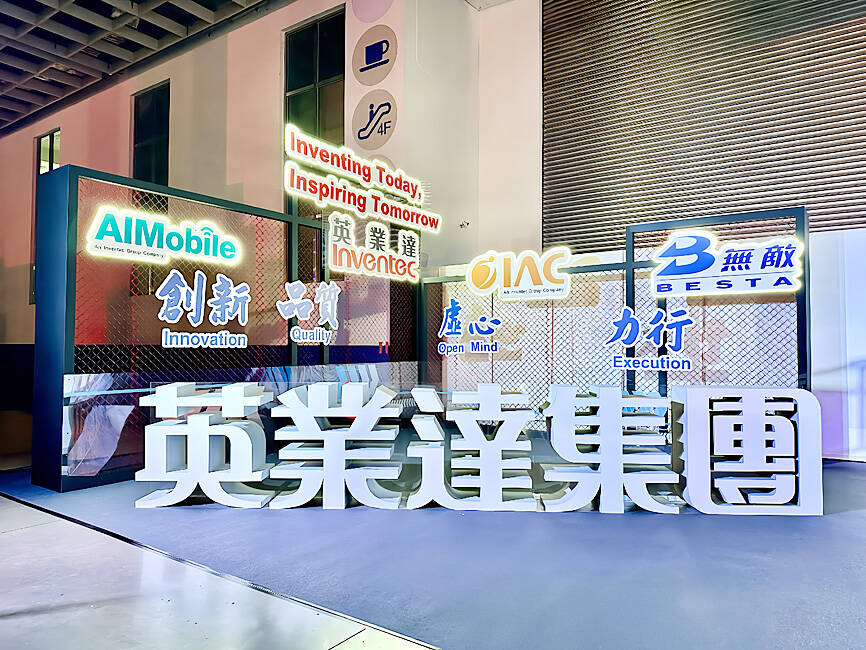Contract electronics manufacturer Inventec Corp (英業達) yesterday posted its best profit in nine quarters as its gross margin continued to increase, despite a decline in revenue.
The company, which produces notebook computers, servers and smart devices for brand clients, reported a net profit of NT$1.99 billion (US$63.35 million) in the fourth quarter of last year, up 6.08 percent from the previous quarter.
Year-on-year, profit was up 42.64 percent, Inventec said in a regulatory filing.

Photo: Fang Wei-chieh, Taipei Times
While revenue in the October-to-December quarter fell 6 percent quarterly and 5 percent annually to NT$128.07 billion, gross margin improved to 5.7 percent, the highest since the first quarter of 2016 when it was 5.92 percent, company data showed.
Inventec attributed the increase in gross margin to an improved product mix — a higher contribution from artificial intelligence (AI) servers and lower shipments of notebook computers — and clients’ nonrecurring engineering fees, which refer to one-time gains from designing, developing and testing new products.
Earnings per share (EPS) were NT$0.55 last quarter, the highest since the third quarter of 2021 when the company made NT$0.78 per share.
Overall, Inventec reported total net profit of NT$6.13 billion last year, up 0.03 percent from 2022, or EPS of NT$1.71, on par with the previous year.
Full-year revenue decreased 5 percent to NT$514.75 billion, but gross margin rose 0.3 percentage points to 5.1 percent, the highest in six years, the company said.
The company’s board of directors has proposed distributing a cash dividend of NT$1.5 per share, Inventec said in a separate filing with the Taiwan Stock Exchange.
If approved by shareholders on June 12, the planned cash dividend, would represent a payout ratio of 87.7 percent.
Based on the company’s closing share price of NT$55.6 yesterday, it would translate into a dividend yield of 2.7 percent.
Inventec expects notebook computer shipments this quarter to be flat or slightly down from last quarter, the company said, adding that shipments next quarter would likely decrease by a high single-digit percentage due to shipment delays on some commercial models.
The company also expects server shipments to grow every quarter this year, with annual server revenue forecast to register double-digit percentage growth from last year, although analysts have said that the new US chip export controls for China might cap Inventec’s AI server sales.

United Microelectronics Corp (UMC, 聯電) expects its addressable market to grow by a low single-digit percentage this year, lower than the overall foundry industry’s 15 percent expansion and the global semiconductor industry’s 10 percent growth, the contract chipmaker said yesterday after reporting the worst profit in four-and-a-half years in the fourth quarter of last year. Growth would be fueled by demand for artificial intelligence (AI) servers, a moderate recovery in consumer electronics and an increase in semiconductor content, UMC said. “UMC’s goal is to outgrow our addressable market while maintaining our structural profitability,” UMC copresident Jason Wang (王石) told an online earnings

Gudeng Precision Industrial Co (家登精密), the sole extreme ultraviolet (EUV) pod supplier to Taiwan Semiconductor Manufacturing Co (TSMC, 台積電), is aiming to expand revenue to NT$10 billion (US$304.8 million) this year, as it expects the artificial intelligence (AI) boom to drive demand for wafer delivery pods and pods used in advanced packaging technology. That suggests the firm’s revenue could grow as much as 53 percent this year, after it posted a 28.91 percent increase to NT$6.55 billion last year, exceeding its 20 percent growth target. “We usually set an aggressive target internally to drive further growth. This year, our target is to

The TAIEX ended the Year of the Dragon yesterday up about 30 percent, led by contract chipmaker Taiwan Semiconductor Manufacturing Co (TSMC, 台積電). The benchmark index closed up 225.40 points, or 0.97 percent, at 23,525.41 on the last trading session of the Year of the Dragon before the Lunar New Year holiday ushers in the Year of the Snake. During the Year of the Dragon, the TAIEX rose 5,429.34 points, the highest ever, while the 30 percent increase in the year was the second-highest behind only a 30.84 percent gain in the Year of the Rat from Jan. 25, 2020, to Feb.

Cryptocurrencies gave a lukewarm reception to US President Donald Trump’s first policy moves on digital assets, notching small gains after he commissioned a report on regulation and a crypto reserve. Bitcoin has been broadly steady since Trump took office on Monday and was trading at about US$105,000 yesterday as some of the euphoria around a hoped-for revolution in cryptocurrency regulation ebbed. Smaller cryptocurrency ether has likewise had a fairly steady week, although was up 5 percent in the Asia day to US$3,420. Bitcoin had been one of the most spectacular “Trump trades” in financial markets, gaining 50 percent to break above US$100,000 and